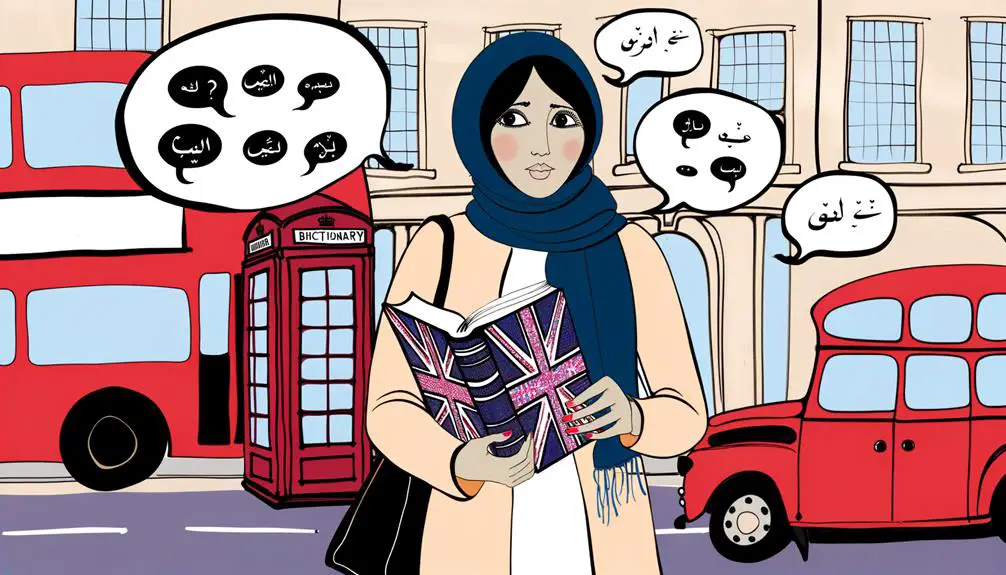British slang represents a complex interplay of linguistic innovation and cultural identity, serving not merely as informal vernacular but as a vibrant channel for social connectivity and expression. Your understanding deepens when you grasp that terms like "cheeky" can oscillate between playful jest and light admonishment, depending on context. Such flexibility showcases slang's capacity to encode collective experiences and attitudes, reflecting both regional diversity and the dynamism of social interactions. Beyond mere words, it encapsulates the essence of British wit, camaraderie, and societal norms. By exploring further, you'll uncover the layers that define and distinguish British slang within the global linguistic landscape.
Key Takeaways
- British slang is a collection of informal words and expressions unique to the UK.
- It reflects cultural traditions, historical roots, and social habits.
- Slang varies regionally, showcasing the UK's linguistic diversity.
- It's used to express identity, camaraderie, and humor.
- British slang evolves with societal changes and technological advancements.
Decoding Cheeky Banter
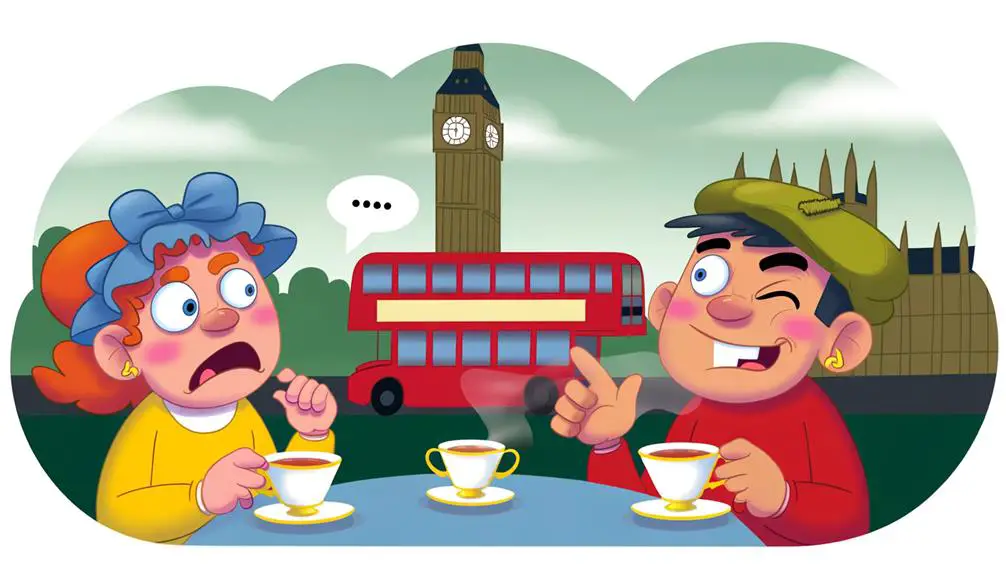
Exploring the domain of cheeky banter, one quickly discovers it's a nuanced form of communication, deeply embedded within British culture, requiring a keen understanding of context and subtlety to fully appreciate its intricacies. This form of dialogue often hinges on polite mockery, an art that threads the needle between humor and respect, making it quintessentially British. It's not merely about the words spoken but how they're delivered, with a wink or a nod, indicating that the jest is made in good spirit.
To navigate this terrain, you must become attuned to the cultural nuances that dictate when and how cheeky banter is appropriate. It's a social dance, where each participant plays their role, understanding that the mock insults are a form of endearment rather than genuine disparagement. This requires a sophisticated level of cultural literacy, as misinterpreting the tone or context can lead to confusion or offense.
In essence, cheeky banter serves as a linguistic mirror reflecting the British penchant for understatement and irony. It's a demonstration of the complexity of human communication, revealing that sometimes, you're closest to those you can jovially mock without misunderstanding. Understanding this dynamic is important for anyone looking to grasp the subtleties of British slang fully.
The Art of the Insult
You'll find that the British lexicon of insults operates within a complex spectrum, where crafting clever jibes is elevated to an art form. The distinction between playful banter and cutting barbs is nuanced, requiring a keen understanding of context, tone, and the relationship between the interlocutors. This segment will explore the intricacies of these interactions, shedding light on the subtleties that define and differentiate them.
Crafting Clever Jibes
In the world of British slang, mastering the art of crafting clever jibes requires an intricate understanding of cultural nuances and linguistic dexterity. This art form, deeply embedded in British communication, thrives on the balance between subtlety and sharp wit. It's not just about what is said but how it's said, making use of both subtle mockery and sarcastic praise to convey a point indirectly yet effectively.
To draw you in and keep you interested, consider the following:
- The significance of tone in delivering the perfect jibe
- The role of context in understanding and appreciating the humor
- How timing can elevate a simple comment into a memorable quip
- The importance of audience awareness to avoid crossing the line from playful to offensive
Mastering this art requires not just a keen sense of humor but also a deep appreciation for the complexities of language and social interaction.
Banter Versus Barbs
What distinguishes playful banter from cutting barbs in the nuanced world of British slang? At its core, banter operates under an unspoken set of rules, a social contract that both parties understand and respect. This mutual comprehension guarantees that exchanges, while potentially sharp, are kept within boundaries of jest. Banter, hence, relies heavily on context, tone, and the relationship between the individuals involved. Misinterpretations can lead to cultural misunderstandings, especially for those unaccustomed to the subtleties of British humor. Barbs, in contrast, lack this foundational respect and camaraderie. They are designed to wound, employing the same linguistic tools as banter but without its underlying affection. Recognizing this differentiation is essential for maneuvering social interactions within British culture, avoiding potential offense while appreciating the art of the insult.
Cheers for Everything
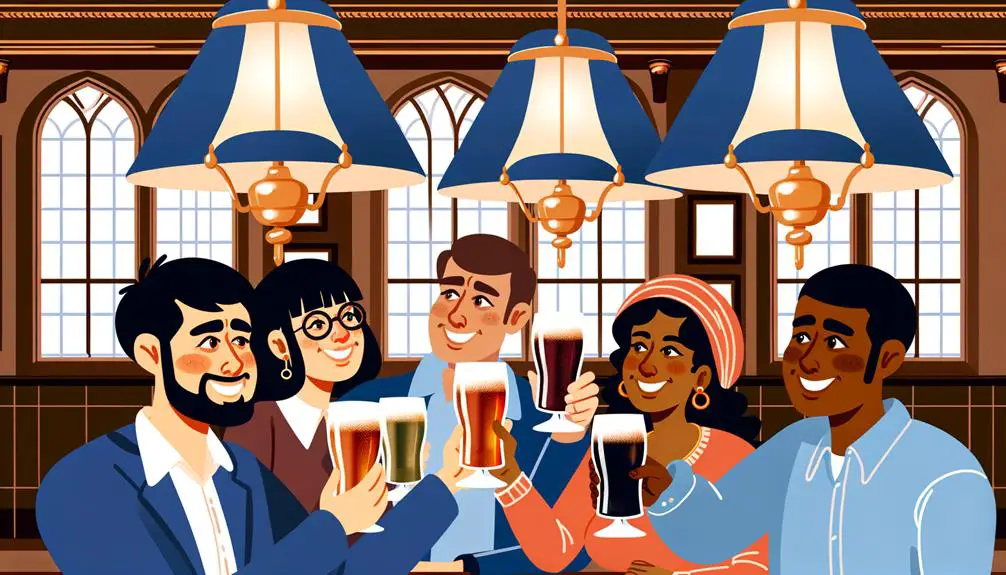
Exploring the diverse world of British slang, one cannot ignore the ubiquitous expression 'cheers,' which functions as a versatile term transcending its initial association with toasting, to encompass a wide range of gratitude and acknowledgment contexts. This linguistic evolution from mere toast traditions to a broader application highlights the dynamic nature of language in reflecting cultural norms and practices. Cheers, in its contemporary usage, embodies a spectrum of gratitude gestures, from a simple thank-you to a heartfelt expression of appreciation.
- Linguistic Shift: How 'cheers' evolved from a term primarily used in toast traditions to a ubiquitous signifier of thanks.
- Cultural Significance: The role of 'cheers' in embodying British norms of politeness and understated gratitude.
- Contextual Flexibility: Analysis of the various scenarios where 'cheers' is employed, beyond the confines of celebratory drinks.
- Comparative Linguistics: The unique positioning of 'cheers' in British English, juxtaposed with similar expressions of gratitude in other cultures.
This exploration into the term 'cheers' reveals its significance as more than a casual or colloquial term; it's a linguistic emblem of cultural identity, showcasing the British predilection for understatement and efficiency in language use.
Food and Drink Lingo
Delving into the rich tapestry of British cuisine, one quickly encounters a vernacular replete with colloquialisms that reveal much about the nation's culture and social habits through its food and drink terminology. You'll find that the British lexicon for food and drink is not only extensive but steeped in tradition and local customs, offering a window into the everyday life of its people.
Central to understanding this linguistic phenomenon is grasping the brewing tea nuances that pervade British society. Tea, more than just a beverage, is an institution, with terms like "builder's tea" denoting a strong, hearty brew, and "afternoon tea" signifying not just a drink, but a light meal consisting of sandwiches, scones, and, of course, tea. This differentiation in terminology underscores the importance of tea in social interactions and its role as a marker of class and occasion.
Equally rich in expressions are the pub grub favorites, a term that encompasses the hearty, often deep-fried or richly sauced dishes served in British pubs. Terms like "bangers and mash" (sausages and mashed potatoes) and "ploughman's lunch" (a cold meal of cheese, bread, and pickles) paint a vivid picture of British comfort food. These colloquialisms not only describe the food but also evoke a sense of communal dining and the pub's role as a social gathering place.
Expressions of Surprise
Exploring the domain of British expressions of surprise, you'll find that these idiomatic phrases are not only plentiful but also mirror a deep-rooted cultural inclination for understatement and humor. This linguistic phenomenon perfectly encapsulates the British penchant for delivering startling idioms and unexpected exclamations with a distinct blend of subtlety and wit.
To engage you further, consider these examples:
- "Blimey!": An exclamation of astonishment, often used to express shock or surprise at something unexpected.
- "Gobsmacked": A vivid term indicating utter astonishment, as if one has been struck in the mouth, rendering them speechless.
- "I'll be a monkey's uncle": This quirky expression conveys disbelief in a humorous way, suggesting that the speaker would be as surprised as if they were related to a monkey.
- "Well, I never!": Used to express surprise or shock, this phrase epitomizes the British tendency towards understatement in moments of astonishment.
The scholarly analysis of these expressions reveals a cultural fabric rich with nuance, where the unexpected is met with a unique blend of humor and understatement. Through these expressions of surprise, one can glimpse the intricate tapestry of British linguistic culture, marked by an affinity for both the subtle and the remarkably witty.
Terms of Endearment
In exploring the landscape of British slang, you'll find that terms of endearment form a unique subset, characterized by common love nicknames and affectionate phrases whose meanings and uses offer insight into cultural values and interpersonal relationships. These terms, ranging from colloquial to traditional, serve not only as linguistic expressions but also as a mirror reflecting societal norms and emotional bonds. An analytical examination of these expressions reveals layers of context, history, and evolution, underscoring their significance beyond mere vocabulary.
Common Love Nicknames
Across the diverse landscape of British culture, you'll find that terms of endearment, often perceived as mere pet names, actually hold significant sociolinguistic weight, reflecting deeper cultural norms and values. These nicknames, with their historical origins and global influence, serve not only as expressions of affection but also as a manifestation of the dynamic evolution of language within intimate relationships.
- Historical Origins: Tracing back to antiquated English, showcasing the evolution of linguistic affection.
- Global Influence: How British terms of endearment have permeated other cultures, indicating their widespread appeal.
- Sociolinguistic Weight: The role these nicknames play in reflecting societal norms and values.
- Cultural Norms: The underlying cultural significance behind the seemingly casual use of pet names.
This exploration reveals the depth behind what might otherwise be dismissed as simple love nicknames.
Affectionate Phrases Explained
Building on the understanding of love nicknames' deep-rooted historical and cultural significance, let's examine specific affectionate phrases to uncover their meanings and implications within British society. British affectionate expressions, or 'cuddle talk', often incorporate romantic idioms that convey intimacy and fondness with a unique blend of humor and endearment. These phrases serve as a linguistic bridge, connecting individuals through shared cultural understanding and emotional resonance. Analyzing these terms reveals a layered tapestry of social norms, values, and the evolution of language in expressing affection. Whether whimsical or traditional, each term carries weight, encapsulating the complexities of human relationships and the cultural context from which it springs. This exploration offers insight into the nuanced ways Britons navigate expressions of love, fostering a deeper appreciation for the art of verbal affection.
British Slang in Pop Culture
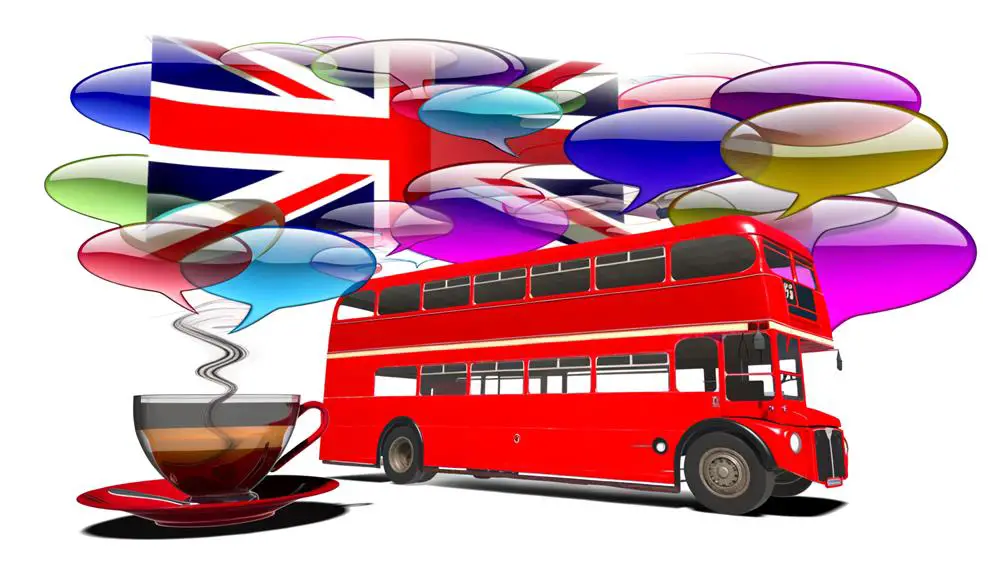
British slang permeates pop culture, offering insights into societal norms and attitudes that you might not grasp through conventional language studies. Through the prisms of music and online phenomena, you're witnessing a vibrant lexicon that shapes and is shaped by the collective British consciousness. Musical influences, for instance, serve as a conduit for slang, with genres like grime and Britpop echoing the streets of the UK in their lyrics, making regional dialects and vernacular globally recognized. Internet memes further propel slang from the fringes to the forefront, transforming obscure colloquialisms into universal jokes, understood and shared by millions worldwide.
To understand the breadth of British slang in pop culture, consider these aspects:
- Musical Lyrics: Songs often incorporate slang, offering a glimpse into the language's evolution and regional differences.
- Television and Film: British series and movies export slang, acting as cultural ambassadors.
- Social Media: Platforms like Twitter and TikTok amplify slang, making it cross-generational.
- Internet Memes: Memes circulate slang, often out of context, showcasing its humorous potential.
Analyzing these elements reveals how British slang not only entertains but educates, fostering a global community that's linguistically interconnected yet uniquely diverse.
Sporting Slang Unpacked
Delving into the world of sports, you'll find that British slang adds a rich layer of cultural nuance and identity to the games, reflecting both historical context and contemporary trends. This linguistic phenomenon is not merely about the lexicon itself but how it encapsulates the essence of British sports culture, including matchday rituals and victory celebrations. The terms used within this domain offer insights into the collective psyche of fans and players alike, embodying a sense of belonging, rivalry, and communal pride.
| Term | Definition | Context |
|---|---|---|
| 'Nutmeg' | Passing the ball through an opponent's legs | A skillful move in football, symbolizing cleverness and agility. |
| 'Duck' | A score of zero in cricket | Reflects the disappointment and the cultural significance of performance in sports. |
| 'Knockout' | To defeat an opponent in boxing | Beyond physical victory, it represents triumph in a highly competitive environment. |
Analyzing these terms, one observes that British sporting slang not only serves as a communication tool but also as a vehicle for expressing identity, camaraderie, and national pride. The analysis of such slang reveals the intricate relationship between language, culture, and the social dynamics of sports, highlighting how victory celebrations and matchday rituals are linguistically constructed and celebrated.
The Language of London Streets
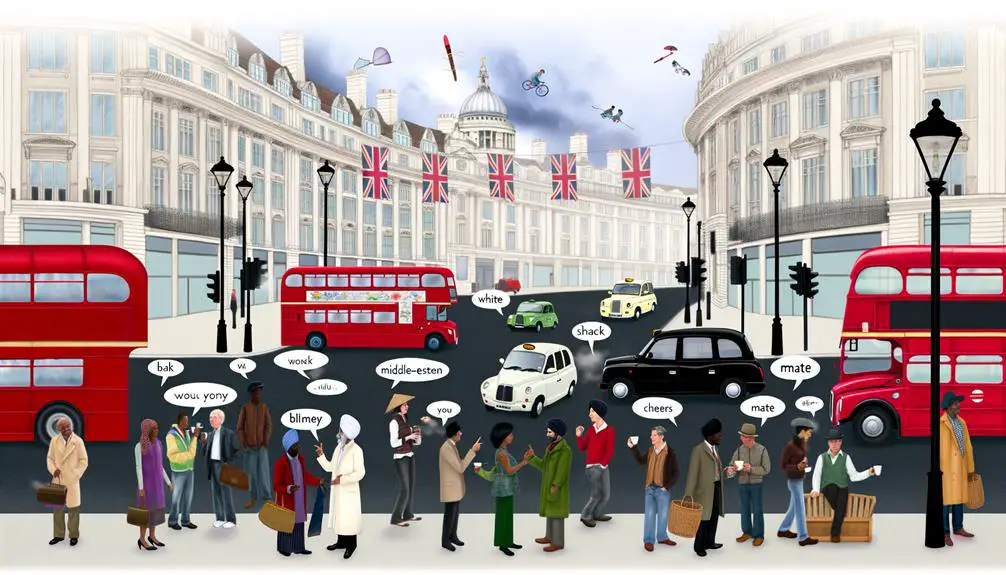
As you explore the language of London streets, you'll find that Cockney Rhyming Slang and Modern Urban Expressions embody the city's dynamic linguistic landscape. These forms not only serve as a means of communication but also as a reflection of London's rich cultural tapestry and evolving identity. Analyzing them reveals the intricate ways in which language adapts to changing societal norms and demographics, offering insights into the broader context of British slang.
Cockney Rhyming Slang
In the heart of London's East End, Cockney Rhyming Slang emerges as a distinctive linguistic phenomenon, intricately weaving words to create expressions that, though bewildering to the uninitiated, offer a rich tapestry of cultural identity and social history.
- Market Lingo: Initially used as a secret mode of communication among traders.
- Historical Origins: Traces back to the early 19th century, reflecting the vibrant life of the working class.
- Lexical Creativity: Demonstrates a unique ability to generate new expressions from everyday experiences.
- Social Bonding: Serves as a marker of group identity among East Enders.
This vernacular, rich in its complexity and creativity, stands as a testament to the enduring spirit and camaraderie of London's working-class communities, embedding within its phrases a collective memory of the city's past.
Modern Urban Expressions
Shifting from the historical origins of Cockney Rhyming Slang, you'll come across the dynamic evolution of language through Modern Urban Expressions, which serve as the vibrant voice of London's streets today. This transformation reflects not only the cultural shifts but also the impact of digital slang, illustrating a fusion between traditional slang origins and the digital age's lexicon.
| Modern Urban Expression | Meaning |
|---|---|
| Peng | Attractive |
| Bare | A lot of |
| Mandem | A group of friends |
| Gassed | Excited |
| Dead | Boring or Uninteresting |
This table showcases how modern urban expressions encapsulate the essence of contemporary London's linguistic landscape, blending the rich heritage of slang origins with the immediacy and brevity of digital slang.
Slang Across the UK
You'll find that the tapestry of British slang varies considerably as you traverse the different regions of the UK, each adding its own unique linguistic color to the broader spectrum of English vernacular. This diversity is not just superficial; it's a reflection of the deep historical, cultural, and social fabric that makes up the British Isles. The significance of regional dialects in shaping linguistic diversity cannot be overstated. They serve as a proof to the localized identities and communities that have developed over centuries.
To understand the complexity and richness of British slang, consider these aspects:
- Regional Dialects: Each region's history and cultural influences shape its unique slang.
- Linguistic Diversity: The UK's slang reflects its multicultural population.
- Social Factors: Slang often emerges from social and youth subcultures, evolving rapidly.
- Technological Influence: Digital platforms facilitate the spread and evolution of slang across regions.
Analyzing British slang reveals a multifaceted linguistic landscape, where historical depth and modern influences converge. It's a dynamic field that continuously adapts, reflecting the ongoing changes within society itself.

